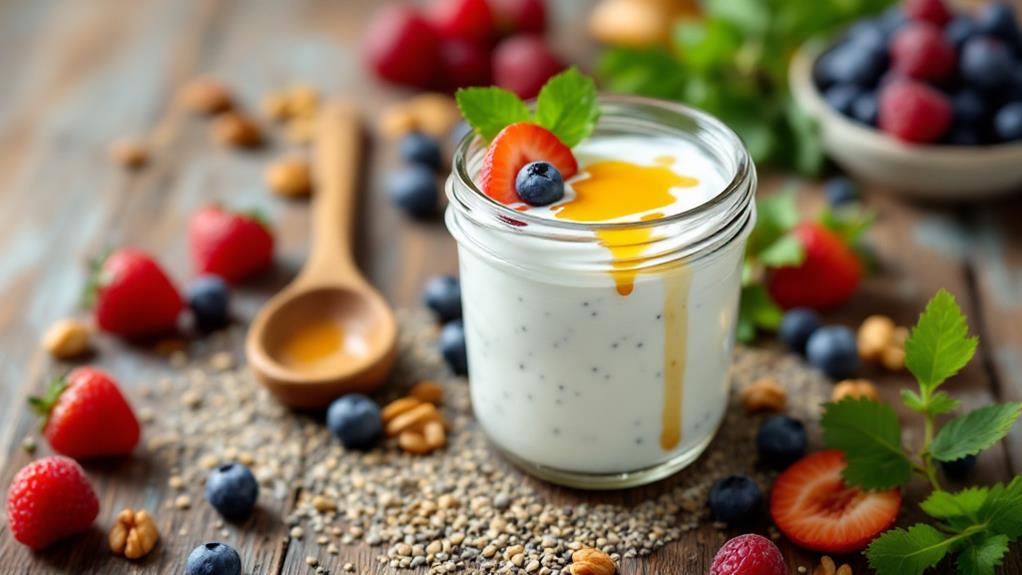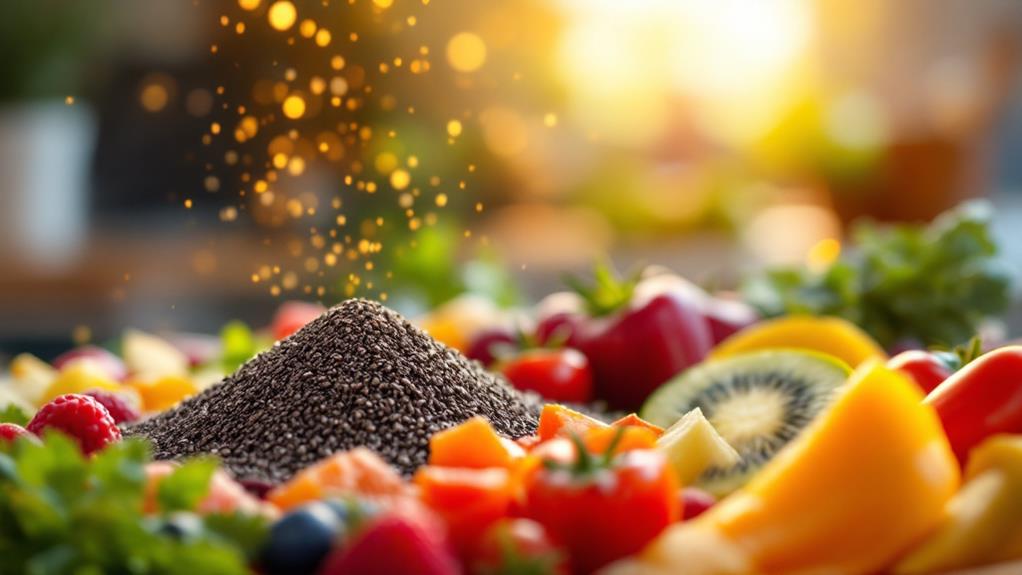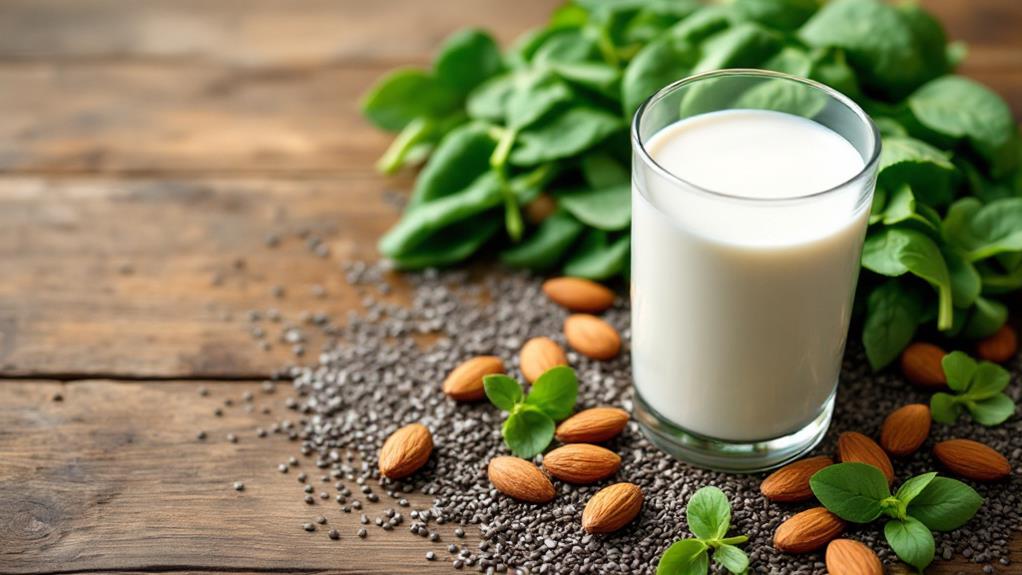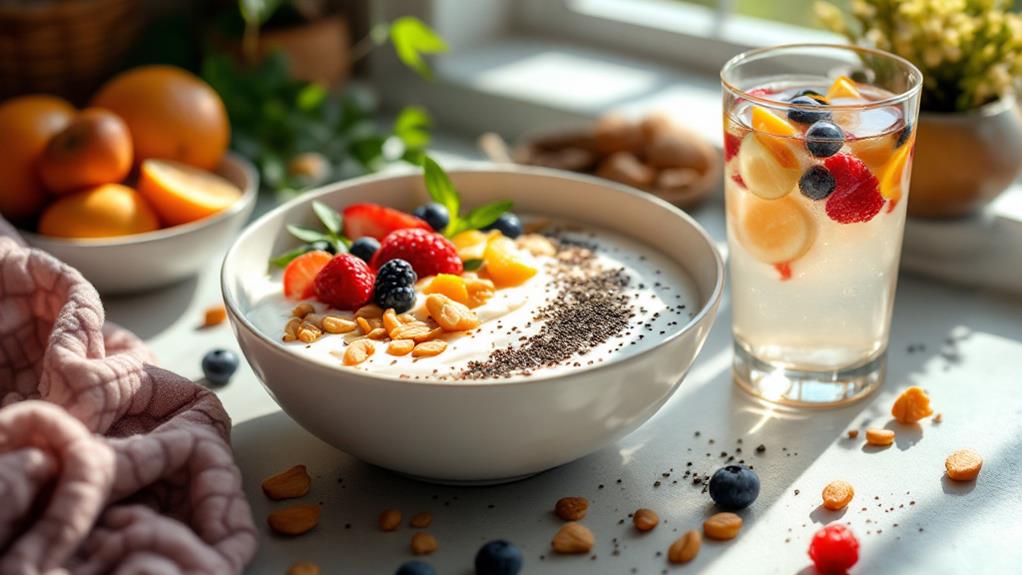Chia Seeds: Health Benefits and How to Incorporate Them Into Your Diet

Chia seeds are small but mighty enhancements to your diet, packed with nutrients like fiber, omega-3s, and minerals. They elevate heart and digestive health, help manage weight, and support bone health with calcium and phosphorus. For easy integration, sprinkle chia on your yogurt, toss them into smoothies, or create a chia pudding by soaking them in milk. Try using them in your baking as a substitute for eggs. Start with about an ounce a day to enjoy these benefits while ensuring enough water intake. Welcome chia seeds to redefine your nutrition, and there's plenty more you might find intriguing.
What Are Chia Seeds
Chia seeds, those tiny black or white marvels, come from the Salvia hispanica plant, which is native to Central America. Historically, they played a significant role in ancient Aztec diets, revered for their energy-boosting properties. You'll find that these seeds are incredibly nutrient-dense, offering a myriad of health benefits.
An ounce of chia seeds provides a remarkable amount of dietary fiber, which supports digestive health and helps you feel full longer. This makes them a fantastic choice for those looking to manage their weight. They're also packed with omega-3 fatty acids, crucial for heart health. The high calcium content in chia seeds supports strong bones, making them a valuable enhancement to your diet.
One of the fascinating aspects of chia seeds is their ability to absorb liquid and form a gel-like consistency. This characteristic opens up a world of culinary uses; you can create delicious puddings, thicken smoothies, or use them as an egg substitute in baking. Embracing chia seeds in your meals not only honors their ancient heritage but also taps into a powerhouse of nutrients that can improve your complete well-being.
Nutritional Profile
Packed with nutrients, these tiny seeds showcase a remarkable nutritional profile that can elevate your diet. Chia seeds are a powerhouse of dietary fiber, with about 9.8 grams per ounce, making them an excellent choice for promoting digestive health and aiding weight management. This high fiber content not only keeps you feeling full longer but also supports a healthy digestive tract.
Each ounce of chia seeds contains approximately 138 calories, along with 4.7 grams of protein and 8.7 grams of fat. This balanced calorie content makes them a nutritious supplement to your meals, providing sustained energy throughout the day. They're also rich in omega-3 fatty acids, particularly alpha-linolenic acid (ALA), which helps maintain a healthier omega-6 to omega-3 ratio in your diet.
Incorporating chia seeds into your diet also means increasing your intake of vital minerals. With 14% of the daily value for calcium and 12% for iron per ounce, chia seeds support bone health and oxygen transport in the body. Plus, they're gluten-free and sugar-free, making them suitable for diverse dietary needs. So, regardless of your goal to improve your nutrient intake or manage your weight, chia seeds are a versatile and valuable supplement to your diet.
Health Benefits

Although often small in size, chia seeds offer significant health benefits that can improve your general well-being. Rich in omega-3 fatty acids, especially alpha-linolenic acid (ALA), chia seeds contribute to heart health by potentially lowering cholesterol levels. You might find these tiny seeds to be an excellent ally in supporting your cardiovascular system.
Their impressive fiber content, approximately 10 grams per ounce, plays a vital role in promoting digestive health. This fiber not only aids digestion but also helps in feeling full, which can be beneficial for weight management. Furthermore, chia seeds contain antioxidants like quercetin and chlorogenic acid. These compounds work to neutralize free radicals, potentially lowering your risk of chronic diseases, including heart disease and cancer.
Including chia seeds in your diet may also improve your blood sugar control, reducing insulin resistance. This can be particularly beneficial if you're managing diabetes, as it helps maintain more stable blood sugar levels. In addition, chia seeds possess anti-inflammatory properties, which can help alleviate inflammation, a factor in many chronic conditions. By integrating chia seeds into your routine, you can harness these health benefits and support your overall health.
Weight Management
In relation to weight management, chia seeds are a powerful ally thanks to their high fiber content. With about 10 grams of dietary fiber per ounce, chia seeds promote feelings of fullness, helping you reduce your total calorie intake. This fiber-rich quality improves satiety, which reduces appetite compared to meals without chia seeds. By incorporating chia seeds into your diet, you can effectively manage your weight more efficiently.
Additionally, chia seeds are a great source of protein, containing all nine vital amino acids, which supports weight management by maintaining muscle mass and further improving satiety. Consuming chia seeds regularly has been linked to reductions in visceral fat, providing evidence of their effectiveness in weight management. They're not just fiber powerhouses; their protein content plays a significant role in keeping you satisfied and full for longer periods.
You can easily incorporate chia seeds into your meals. They're perfect for adding to smoothies or oatmeal, increasing the nutrient density without adding many calories. Thanks to their low-calorie and high-fiber profile, chia seeds make it easier to stick to your weight management goals while ensuring you stay full and satisfied throughout the day.
Bone Health

In relation to bone health, chia seeds are an impressive supplement to your diet. They're packed with calcium, providing about 14% of the daily value per ounce, which is essential for maintaining bone health and bone mineral density. Calcium isn't the only mineral chia seeds offer; they're also rich in magnesium and phosphorus. With 23% of the daily value of magnesium, chia seeds assist in bone formation and regulate calcium levels in your body. Phosphorus, accounting for about 20% of the daily value in just one ounce, supports proper bone structure and function.
Incorporating chia seeds into your diet can help reduce the risk of bone-related issues. Animal studies suggest that chia seeds may improve bone mineral content and density, though more human research is needed. The omega-3 fatty acids, especially alpha-linolenic acid (ALA), found in chia seeds also contribute positively to bone health. These nutrients might elevate bone mineral density, offering another layer of protection against bone weakening.
To integrate chia seeds into your diet, consider adding them to smoothies, yogurt, or cereals. This simple enhancement can provide a significant improvement to your bone health regimen.
Culinary Uses
Chia seeds offer a multitude of culinary uses due to their mild flavor and adaptability. You can easily incorporate them into smoothies, oatmeal, or yogurt, enhancing nutrition and texture without overpowering the dish. When chia seeds absorb liquid, they develop a gel-like consistency, making them perfect for creating chia pudding—a delicious and nutritious snack or breakfast that's both easy to prepare and satisfying.
In baking, chia seeds shine as a versatile ingredient. They can replace eggs in vegan recipes or serve as a binding agent in muffins, pancakes, and breads. This makes them an excellent choice for those looking to experiment with plant-based cooking. Beyond baking, sprinkle chia seeds on salads or cereals to add crunch and nutrients, elevating fiber content without altering the flavor considerably.
Their ability to absorb liquid also makes chia seeds an effective thickening agent. Use them in soups, smoothies, or sauces to achieve the desired thickness while enhancing nutritional value. By adding chia seeds to your culinary creations, you'll not only delight in their versatility but also enjoy the added health benefits they bring to every meal.
Daily Consumption Tips

Incorporating chia seeds into your daily routine can improve your nutrition with minimal effort. The recommended daily serving size is about 1 ounce (28 grams), or 2 to 3 tablespoons, which provides a host of nutritional benefits without excessive calorie intake. Since chia seeds are high-fiber foods, it's wise to gradually introduce them into your diet. Doing so can help minimize digestive discomfort, such as bloating or gas, that might occur if you're not used to high-fiber foods.
Ensure you maintain adequate water intake when you consume chia seeds. Their high fiber content absorbs liquid, which can lead to digestive issues if you're not properly hydrated. A good way to incorporate chia seeds is by including them in smoothies, yogurt, or oatmeal. Not only do they amplify the nutritional profile of these meals, but they also improve the flavor.
Monitor your body's response to chia seeds and adjust your intake accordingly. Remember, excessive consumption can lead to digestive problems. Moreover, if you're on certain medications, consulting a healthcare provider before increasing your chia seed intake is a prudent step. This way, you can safely enjoy their benefits.
Easy Chia Recipes
For an easy and nutritious improvement to your meals, chia seeds provide a versatile ingredient that can transform simple dishes into nutrient-rich delights. They're a powerhouse of health benefits, including being a source of omega-3 fatty acids and high in fiber. Incorporating them into your diet is simple with these healthy recipes:
- Chia Pudding: Mix 2 tablespoons of chia seeds with 1/2 cup of your preferred milk. Shake well and refrigerate for at least 15 minutes or overnight. It's a nutritious and filling snack or breakfast option.
- Chia Smoothies: Add 1-2 tablespoons of chia seeds to your favorite smoothie. You'll elevate its fiber and omega-3 fatty acids without altering the taste.
- Chia Oatmeal: Stir in 1 tablespoon of chia seeds into your oatmeal while cooking. This improves its nutritional profile, adding about 2.5 grams of protein and 5 grams of fiber per tablespoon.
- Chia Seed Jam: Combine 2 cups of mashed fruit with 2 tablespoons of chia seeds. Let it sit for 30 minutes to make a healthy, homemade jam.
- Baked Goods: Replace 1 egg with 1 tablespoon of chia seeds in recipes like muffins or pancakes to add moisture and nutrition.
These easy chia recipes not only elevate your meals but also enrich your diet with vital nutrients.




